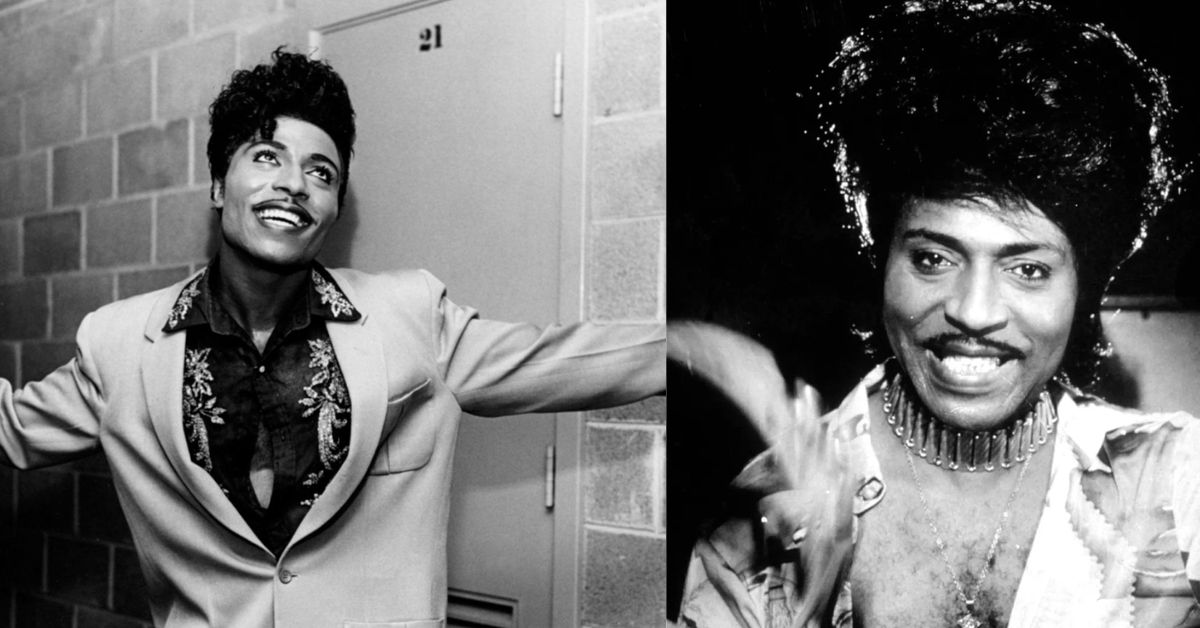Little Richard, born Richard Wayne Penniman on December 5, 1932, in Macon, Georgia, was the third of twelve children. His family was deeply religious, with gospel music playing a significant role in his upbringing. Richard’s early exposure to church choirs and his fascination with flamboyant performers like Sister Rosetta Tharpe and Mahalia Jackson ignited his passion for music.
As a teenager, he began blending gospel with rhythm and blues, creating a style uniquely his own. His big break came when he started performing at local venues, showcasing his electrifying stage presence and uncontainable energy, which foreshadowed his future success in rock and roll.
Rise to Fame
Little Richard’s meteoric rise began with the release of “Tutti Frutti” in 1955, a groundbreaking track that introduced the world to his raspy vocals, virtuosic piano playing, and magnetic flamboyance. Songs like “Long Tall Sally,” “Good Golly, Miss Molly,” and “Lucille” followed, solidifying his place as one of the pioneers of rock and roll.
Richard’s bold stage persona, characterized by his glittering costumes and unapologetic confidence, redefined entertainment standards, inspiring artists like Elvis Presley, James Brown, and Mick Jagger. His influence on the music industry was monumental, breaking racial barriers and uniting audiences during a segregated era.
Drug Use and Challenges
Despite his early teetotaler lifestyle in the 1950s, the pressures of fame took their toll. By the 1960s and 1970s, Richard spiraled into drug addiction, battling dependencies on cocaine, heroin, and PCP. These struggles affected his personal life and professional career, leading to erratic behavior and diminishing performances.
The tragic deaths of close friends and a series of personal losses served as a wake-up call, prompting Richard to seek redemption. This turning point marked his return to religion and a renewed focus on his spiritual journey.
Religious Journey
Religion was a constant in Little Richard’s life. Raised in the Baptist and African Methodist Episcopal (AME) churches, he was introduced to Pentecostalism and faith healing during his youth. In 1957, Richard experienced a dramatic religious conversion, leaving rock and roll at the height of his fame to pursue ministry work.
Ordained as a minister, Richard preached themes of racial unity, repentance, and salvation. Over the years, his spiritual beliefs evolved, including a brief interest in Judaism in 1986 before returning to his roots in the Seventh-day Adventist Church (SDA) later in life.
Health Problems and Decline
Richard’s later years were marked by significant health challenges. A serious car accident in the 1980s led to ongoing sciatica issues, while hip surgery and a heart attack further impacted his mobility. Despite these setbacks, Richard remained resilient, occasionally performing and giving interviews to connect with his fans.
His declining health was a recurring topic in public updates, with Richard showing remarkable strength in facing adversity.
Death and Tributes
Little Richard passed away on May 9, 2020, at the age of 87, due to bone cancer. Tributes poured in from across the world, with music legends like Bob Dylan, Paul McCartney, and Elton John praising his unparalleled contributions to music and culture.
Richard was laid to rest at Oakwood University Memorial Gardens Cemetery in Huntsville, Alabama, a fitting honor for a man who spent much of his life intertwining music and spirituality.
Table of Honors and Awards
| Year | Honor/Award | Details |
| 1956 | Cashbox Triple Crown Award | For “Long Tall Sally.” |
| 1984 | Inducted into Georgia Music Hall of Fame | Recognized for his contribution to music in Georgia. |
| 1986 | Inducted into Rock and Roll Hall of Fame | Part of the inaugural class of inductees. |
| 1990 | Star on Hollywood Walk of Fame | Honored for his impact on entertainment. |
| 1993 | Grammy Lifetime Achievement Award | Acknowledged for his groundbreaking influence in music. |
| 1994 | Lifetime Achievement Award from the Rhythm and Blues Foundation | For his significant contributions to R&B music. |
| 1997 | American Music Award of Merit | Celebrated for his enduring legacy in music. |
| 2002 | BMI Icon | Recognized alongside Chuck Berry and Bo Diddley. |
| 2002 | Inducted into NAACP Image Award Hall of Fame | Honored for his role in shaping African American culture and music. |
| 2003 | Inducted into Songwriters Hall of Fame | Recognized for his songwriting achievements. |
| 2006 | Inducted into Apollo Theater Hall of Fame | Acknowledged for his connection to the historic venue. |
| 2008 | Star on Nashville Music City Walk of Fame | Honored for his contributions to music in Nashville. |
| 2009 | Inducted into Louisiana Music Hall of Fame | Recognized for his impact on music in Louisiana. |
| 2010 | Plaque on Apollo Theater Walk of Fame | Commemorated for his influence on entertainment and culture. |
| 2013 | Honorary Degree from Mercer University | Recognized for his contributions to music and culture. |
| 2015 | Inducted into Blues Hall of Fame | For his pioneering role in blues music. |
| 2015 | Inducted into Rhythm and Blues Music Hall of Fame | Acknowledged for his influence on R&B music. |
| 2015 | Rhapsody & Rhythm Award from the National Museum of African American Music | Celebrated for his lasting legacy in African American music. |
| 2019 | Distinguished Artist Award at Tennessee Governor’s Arts Awards | Recognized for his lifetime achievements in the arts. |
Legacy in Music and Popular Culture
Little Richard proudly proclaimed himself the “Architect of Rock and Roll,” a title well-deserved given his pivotal role in shaping the genre. His music laid the groundwork for rock, soul, and funk, with timeless hits like “Tutti Frutti” and “Long Tall Sally” serving as blueprints for future generations.
Artists from The Beatles to Prince credited Richard as a source of inspiration. Recognized as one of the greatest performers of all time, his influence transcended music, impacting fashion, performance art, and cultural attitudes toward individuality and self-expression.
READ MORE : Sissy Sheridan’s Biography: Age, Height, and Career
Conclusion
Little Richard’s legacy is one of trailblazing innovation and unyielding resilience. As a pioneer of rock and roll, his contributions continue to resonate, influencing music and culture worldwide.
His journey from a small-town boy in Macon, Georgia, to a global icon reminds us of the transformative power of talent, determination, and staying true to oneself. Little Richard remains an enduring symbol of the boldness and brilliance that defined rock and roll’s golden age.

Rory Leo, the creator of DuskPulse.com, is a celebrity news lover who shares the latest stories and trends from the entertainment world. Rory’s goal is to keep readers informed and entertained with fresh, reliable updates every day.











